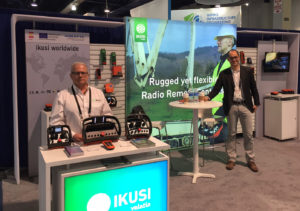 I had a great chat with Scott Pastorius of Ikusi at IFPE, and he filled me in on his company’s line of ergonomically designed radio remote controls for the mobile market.
I had a great chat with Scott Pastorius of Ikusi at IFPE, and he filled me in on his company’s line of ergonomically designed radio remote controls for the mobile market.
“We invested a lot of time and money in the ergonomics, because operators are using these controls more and more as a point of control. They’re using them for full shifts,” he said. “Comfort, lightweight, ruggedness are all things that are desired—and we are meeting that market demand with our ergonomic design.”
Ikusi is using a Spanish university to design everything ergonomically, doing user case studies. Pastorius said they are looking at the human architecture and conforming the company’s controls to adapt to human nature and form.
The biggest market for them right now “by far” is construction, he said.
“We actually are not limited by the markets we pursue,” he said. “We have installations in agriculture, mining, construction, industrial applications, and automation systems. We have worked with hydraulic integrators, and support their efforts. We work very closely with OEMs to support them, and we have become an extension of their engineering department to design controls specific to their equipment.”
When customers come to Ikusi’s booth here at IFPE, price point, reliability and durability are really the main issues on their mind.
“Price is always one of the lead-ins, people want to see where there’re at, because the North American market has a very high price point for remote controls,” he explained. “The European controls are at a lower price point. Really, what is comes down to is reliability, the system, how easy they are to maintain. We have launched a mini-website that is a diagnostic site for our equipment, and it’s mobile app oriented. When you’re out in the field, if you have difficulty with your equipment, you can go on the site. You can go down through the form that’s on the internet and diagnose the problem with your equipment. We even have videos attached on how to make repairs, how to make changes, whom to contact by region.”
As you might guess, the company is very custom product oriented, without a real standard. Pastorius said they have base models that they start with, but everything is very customized to the customer’s specific requirements and to interface with their specific controls.
“We work very closely with everything that’s out there on the market, because everyone has their own different software protocols—we are compatible with them all.”
Filed Under: Mobile Hydraulic Tips, News, Slider